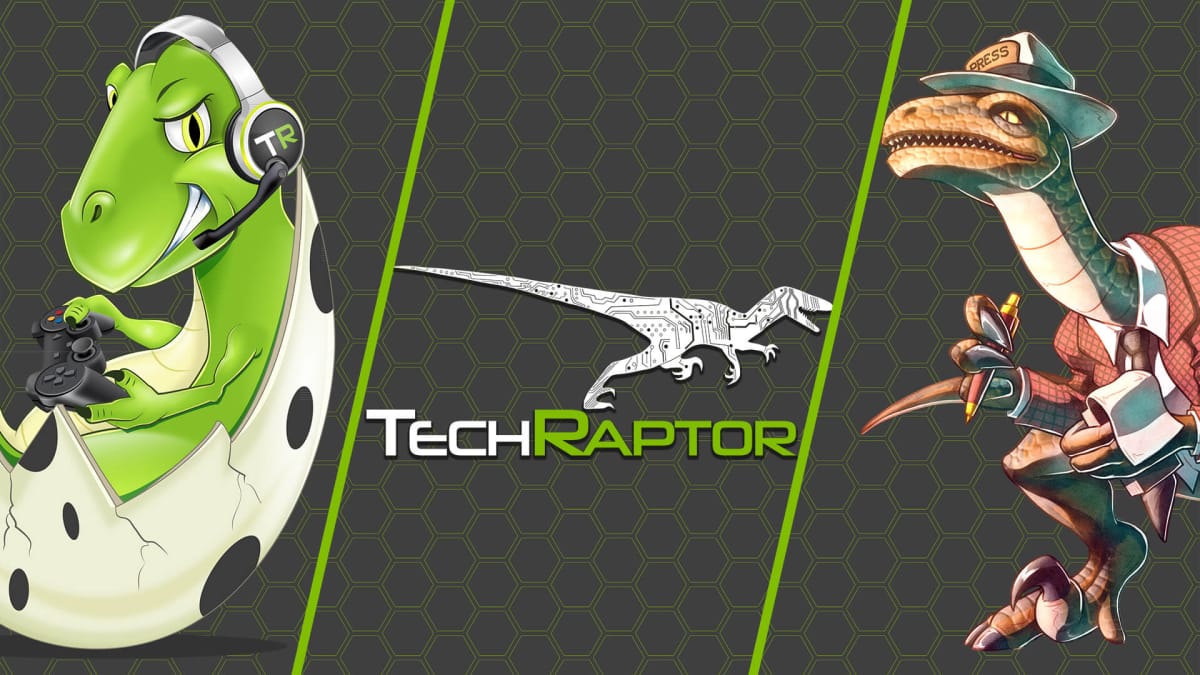From the Founder, Rutledge Daugette
It has been 8 years since I started TechRaptor (March 2013), and honestly the site has grown to something bigger than I ever originally imagined. We started with a really basic site and a few thousand views a month, and it’s grown into a custom-built platform that serves millions of users a month. It’s absolutely incredible. I’m stupidly thankful for the success we’ve seen, and especially the people who work on the site alongside me.
It hasn’t been a perfect journey, one in which we’ve (and especially I’ve) made some mistakes during the 8 years that TechRaptor has been in operation. While there were others involved in these mistakes, ultimately they fell on me for failing to provide good leadership and direction.
The TechRaptor of 2021 is a very different organization than it was in 2013-2016, because with every mistake we’ve made, we’ve adjusted how we operate to be a better website and company for both our readers and our staff.
We’ve got an incredible internal culture built on transparency, positivity, and shared passion. We raise pay at least four times a year as we grow. Our editorial standards continue to improve, and we continue to put every possible tool we can in our team’s hands to make their jobs easier and more fun.
We Had To Learn The Hard Way
Unfortunately, getting to this point took a lot of learning. When you’ve never run a company, built a team, or actually had any experience in journalism, building a site like TechRaptor comes with a lot of mistakes, and a lot of pain and frustration. I’ve had some hard lessons, burned plenty of bridges, had mental breakdowns, and shed tears of both sadness and joy.
But everything we’ve ever done has led to something else, and every mistake we’ve made has led to a better understanding of how to operate, take care of our team, and ultimately become a better place for gamers to read and developers to work with.
This next part is hard. It’s already hard to admit your mistakes, but when a series of mistakes are made, it becomes even harder. Even worse, when these mistakes hurt people, they’re painful to dig up and address, but we feel we need to for closure and a desire to move forward.
(Re)Assessing Ourselves as an Outlet
With the focus on positive culture and content over the last 5+ years, we’ve been having long and difficult conversations about how we can be a better outlet and have a more positive impact within the gaming industry. These will never end—we can always do better and be better.
It’s easy to be negative, easy to write and publish articles and opinions rooted in anger or frustration—not every game can be perfect, right? That is why we continue to work as an outlet to bring more positivity into our feeds, highlighting great stories and great causes, as well as welcoming more unique and diverse voices to the site’s content through paid staff writers, as well as freelance pitches we began accepting last year.
With that in mind, one of our biggest internal discussions for the last few years has been content of the past. We particularly spoke about articles with broken images or layouts as we outgrew or changed website platforms, as well as those that have content that don't match the editorial standards we hold ourselves to in 2021.
From 2013 to 2016 we not only published a lot of content that, looking back, is awkward to read, but a good amount that is also just poor, misleading, or lacking research.
Making the decision that we’re detailing below was not easy. Across the editorial team we’ve spent a huge chunk of time discussing how to go through older content and cut things that don’t meet our standards.
As of today, we’ve removed a large number of articles from the time period of 2013 to 2016. This content includes reviews, features, interviews, opinion pieces, and some of the news published during that time period. This content has been removed for one reason: it just doesn’t meet our standards of today, no longer representing the quality and direction of TechRaptor in 2021.
We had near-nonexistent editorial policies until Andrew took over as Editor in Chief in January of 2015, and it still took us a year to develop better guidelines, standards, and overall content strategy. Before then, a lot of articles went out without much discussion or review of grammar, tone, and whether they were something that should be published. The writers of that time didn’t fail us; we failed them in not setting solid policy.
In fact, we’ve removed over 20% of content from everything we published in 2013-2016. There’s likely still a large chunk of content that doesn’t meet our content standards now, but we combed through almost 6,000 articles to catch as many as we could. In the coming years, we’ll likely continue to reassess older articles and ensure that our content meets a higher standard. We plan on assessing past content on a regular basis going forward, as well.
What about the TechRaptor GamerGate Articles?
In doing this, we knew that this could impact the vast majority of content we published surrounding the events, or about, GamerGate.
This is a hard subject for a lot of people, myself included. Ultimately, it’s simple—much of TechRaptor’s coverage of GamerGate and surrounding events had and has the potential to hurt or impact a number of people negatively, and our lack of editorial policies provided poor content that doesn’t meet the standards we hold ourselves to today. We failed in the key tenet of “do no harm,” and it took us until mid-2016 to really realize that we hadn’t been the outlet we wanted to be.
I’m not going to hash out every article we published about or surrounding GamerGate. As of today, a large number of articles from that period have been removed from the site due to the fact that they just don’t meet good standards for high quality journalism.
The TechRaptor GamerGate-related articles (and broader content from that time, especially my early articles) have been an internal discussion since 2016. We tried to address them in 2017 but ultimately botched the execution of what we wanted to accomplish. In 2017, we felt it was hypocritical for us to delete a large part of our site’s history, which is why we added an editor’s note to the many articles we published during (and before/after) the time of GamerGate.
After a few (more) years of discussion, we feel that is no longer the right decision. While many of these articles weren’t inherently violent or inciting negativity, we feel that they no longer represent the quality we hold ourselves as a site today, and others were just incredibly broken and next to unreadable in their current state.
There is, and never was, a reason to have directly targeted or referenced specific people in a negative way, especially with many articles being conjecture or missing some key facts. We misled ourselves in believing that we were doing something of quality, when ultimately our lax editorial policies led to content that was questionable and inflammatory at best. Once again, this was my failing as a leader and not the fault of the author(s).
Looking to the Future As An Outlet
My focus for the last few years and into the future is to ensure we create quality content and not repeat the mistakes of the past. We are a much different outlet (and team) than we were in 2014/2015, and I hope that people can look at our content of the past and see just how much work we've put into becoming a better place for gamers to read, and developers to work with.
We’ve spent a lot of time (re)building a culture that is positive, uplifting, and encouraging internally, and one of my big goals for the future is to give back in some way through charitable giving and advocacy. Starting with Safe in Our World this month, we’re actively contributing monthly, as well as making efforts to do fundraising throughout the year.
Going forward, all I can ask is to judge us on our actions and coverage these past few years, which are the result of learning from our mistakes. We will continue to strive to be a source of support for those that need and deserve it, not a source to tear down any one individual or group. That does not discount our past in any way, but I would hope it shows just how far we've come and how much we've changed into what we truly want to be: a positive force that highlights and celebrates what we all love—games.
Building TechRaptor has been a complicated process filled with all kinds of growing experiences and opportunities to learn, not all of which have been positive, but where we are today shows that we've used each one of those moments to course correct and steer ourselves back in the right direction.
We’ve put a lot of work into improving our policies and content, and covering important topics. Here’s a few examples below of work we’ve done in recent years that we’re proud of:
- How a Game Preservation Museum Is Keeping Your Favorite Games Alive
- From Damsel to Defender: Princess Zelda's 35-Year Journey
- Where Cyberpunk 2077 Succeeds: Giving Sex Workers A Story
- Queer Characters in Gaming - A Brief History
- How World of Warcraft Modeled a Pandemic
- The Outer Worlds Hilariously Rewards Your Incompetence
- The Historical Truths of Ghost of Tsushima
- Doom Eternal: The Terrifying Silence of the Doom Slayer
- Fallout 2 Turns 20
- 35 Years Of Influence - A Look Back at Origin Systems, Creators of Ultima and More
- The Best Game Music of 2020 - Ghost of Tsushima
- The Cost of Gaming Since the 1970s
- Biblical Themes in Mass Effect (Part 1) (Part 2) (Part 3) (Part 4)
- How 11 Bit Studios Created Society Survival Simulator Frostpunk
- Hades: The Myths Behind the Weapons
- The "Definitive" Persona Games Dilemma
- Video Game Grunts, Groans, and Screams - J. B. Blanc Sheds Light on Voice Acting
- What G2A Is and Why You Should Care
- What Gaming Gets Wrong About Lovecraft
Have a tip, or want to point out something we missed? Leave a Comment or e-mail us at tips@techraptor.net

